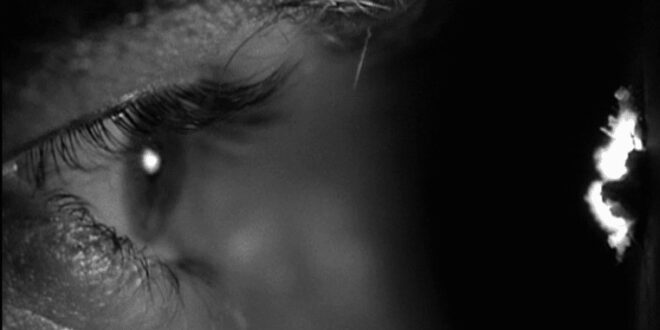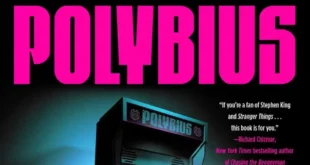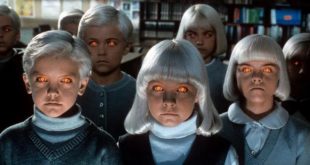Psycho is a classic psychological thriller and horror film that has become iconic in the history of cinema and has forever etched itself into horror and pop culture. Regarding the success of the film, Hitchcock said, “Thirty-three percent of the effect of Psycho was due to the music.”
However, in addition to that thrilling, screechy violin theme, there is another creepy theme to Psycho that creates an unsettling mood: Voyeurism. The film is known for its innovative storytelling, suspenseful atmosphere, and groundbreaking approach to the horror genre. In addition to so many horror flicks emulating the shower scene’s music during scary moments (and the shower scene itself), voyeurism has become one of the regular elements of horror.
Michael Myers was creeping around Haddonfield not just because he was a creep, but also because Anthony Perkins did it in Psycho as Norman Bates (and, as an obvious hint at Psycho’s influence on Halloween, consider that Jamie Lee Curtis is the daughter of Janet Leigh). Norman Bates’ creepy spying was even an influence on the Friday the 13th franchise, as both Jason and Pamela Voorhees typically spy on people before they turn the heat up, too. Voyeurism plays a significant role in Psycho, contributing to the film’s tension and psychological depth.
‘Psycho’ is Voyeuristic Even Before the Shower Scene
One of the key elements of voyeurism in Psycho is Hitchcock’s use of the camera to create a sense of voyeuristic identification with the characters. The audience is positioned as unseen observers, peering into the characters’ private lives. This is evident in the opening sequence of the film, which features Marion Crane (played by Janet Leigh) and her lover, Sam Loomis (played by John Gavin), in a hotel room. As the camera lingers on their intimate moments, the audience is invited to engage in an act of visual intrusion, akin to the role of a voyeur.
…Then Norman’s ‘Mom’ Shows Up and Makes Cinematic History
Of course, the most famous example of voyeurism in Psycho occurs in the infamous shower scene. At first, Norman is a peeping tom, checking out Marion as she disrobes, making us see the world through his pervy eyes. Then, as the relatively innocent-minded viewers might think, “Oh, how nice! She is happily taking a shower!,” Marion Crane is brutally murdered in the shower by “Mother.”
The shower scene is a masterclass in suspense and editing, with the audience again placed in the position of a voyeur witnessing a violent and private act. Hitchcock, the “master of suspense,” uses the shower curtain, the close-ups, and the rapid cutting to contribute to the audience’s heightened sense of voyeuristic involvement in the scene. Norman Bates himself is a character deeply connected to the theme of voyeurism, and murder is the consequence.
There is also a sense of betrayal of trust; as the owner of the Bates Motel, Norman secretly watches Marion Crane through a peephole in the wall of Cabin 1, where she is ostensibly supposed to have some degree of privacy. This act of spying on guests is emblematic of Norman’s disturbed and voyeuristic nature, but it’s also not entirely sexual; it is later revealed to be partly a result of his complex psychological issues (“Mother’s” homicidal tendencies, which are manifestations of his feelings of guilt and loyalty to his puritanical, domineering mother, rather than someone solely acting to achieve sexual jollies, or because he identifies as a woman or other oversimplification of the story’s themes).
Final Thoughts
In Psycho, Alfred Hitchcock not only uses voyeurism as a narrative device but also explores the psychological effects of being observed and the blurred lines between the observer and the observed, similar to Hitchock’s other film, Rear Window.
The film’s exploration of voyeurism adds a layer of psychological complexity to the narrative and contributes to the suspense and horror that make Psycho a landmark in the history of cinema. Of course, if you’re a reader and heavily invested in exploring these themes, you can always check out the 1959 novel of the same name by Robert Bloch, upon which this film was based.
Though it’s easy to overstate a popular film’s influence and generate eye rolls, it’s not so easy to do that with this film. In addition to the horror genre, many other pop culture references to this story exist. For example, Rockwell and Michael Jackson’s paranoia-tinged song “Somebody’s Watching Me” contains the line: “…But maybe showers remind me of ‘Psycho‘ too much.”
Also, Billy Joel’s “We Didn’t Start the Fire” has two references to Hitchcock-related topics (Hitchcock actress Grace Kelly becoming “Princess Grace” and a quick name-drop of this film). Also, in 1992, the Library of Congress deemed the film “culturally, historically, or aesthetically significant” and selected it for preservation in the United States National Film Registry.
What are your thoughts on voyeurism in Psycho? Pretty creepy, right? Or are you into that sort of thing?
 PopHorror Let's Get Scared
PopHorror Let's Get Scared




